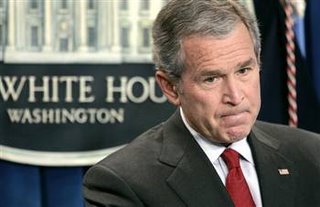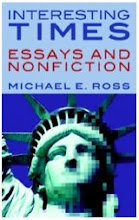In the future, a shockingly powerful statement on the prospects for American dictatorship made by retired Supreme Court Justice Sandra Day O'Connor may resonate with an unlikely irony: For generations yet unborn, one reporter's recalled paraphrase of a 400-word precis may be our only indicator of an unsettling assessment of what may be a dangerous American trend. Irony of ironies: In a time of relentless press coverage of everything under the sun, in the researchable and archivable Internet age, perhaps the most dire, woeful forecast of the nation's possible future ever uttered in public largely managed to fly under the radar of the 24/7 press.
O'Connor's cri de coeur (or cri pour la justice) took place on March 9, sometime during a speech that morning at Georgetown University. Despite the profile of the speaker, just five weeks removed from being in one of the nine most powerful jobs in American life, it seems that the speech was scarcely covered by the press. From all indications, National Public Radio reporter Nina Totenberg was the only press witness to the event. No recording, no videotape, as yet no official transcript from the speaker herself.
What follows here is a transcript of O'Connor's comments as reported by Totenberg on NPR and published online by RawStory.com:

Totenberg: "In an unusually forceful and forthright speech, O’Connor said that attacks on the judiciary by some Republican leaders pose a direct threat to our constitutional freedoms. O’Connor began by conceding that courts do have the power to make presidents or the Congress or governors, as she put it “really, really angry.” But, she continued, if we don’t make them mad some of the time we probably aren’t doing our jobs as judges, and our effectiveness, she said, is premised on the notion that we won’t be subject to retaliation for our judicial acts. The nation’s founders wrote repeatedly, she said, that without an independent judiciary to protect individual rights from the other branches of government those rights and privileges would amount to nothing. But, said O’Connor, as the founding fathers knew, statutes and constitutions don’t protect judicial independence, people do.
"And then she took aim at former House GOP leader Tom DeLay. She didn’t name him, but she quoted his attacks on the courts at a meeting of the conservative Christian group Justice Sunday last year when DeLay took out after the courts for rulings on abortions, prayer and the Terri Schiavo case. This, said O’Connor, was after the federal courts had applied Congress’ onetime only statute about Schiavo as it was written. Not, said O’Connor, as the congressman might have wished it were written. This response to this flagrant display of judicial restraint, said O’Connor, her voice dripping with sarcasm, was that the congressman blasted the courts.
"It gets worse, she said, noting that death threats against judges are increasing. It doesn’t help, she said, when a high-profile senator suggests there may be a connection between violence against judges and decisions that the senator disagrees with. She didn’t name him, but it was Texas senator John Cornyn who made that statement, after a Georgia judge was murdered in the courtroom and the family of a federal judge in Illinois murdered in the judge’s home. O’Connor observed that there have been a lot of suggestions lately for so-called judicial reforms, recommendations for the massive impeachment of judges, stripping the courts of jurisdiction and cutting judicial budgets to punish offending judges. Any of these might be debatable, she said, as long as they are not retaliation for decisions that political leaders disagree with.
"I, said O’Connor, am against judicial reforms driven by nakedly partisan reasoning. Pointing to the experiences of developing countries and former communist countries where interference with an independent judiciary has allowed dictatorship to flourish, O’Connor said we must be ever-vigilant against those who would strongarm the judiciary into adopting their preferred policies.
It takes a lot of degeneration before a country falls into dictatorship, she said, but we should avoid these ends by avoiding these beginnings." [Italics are mine]
RawStory.com, the bloggers and some of the online press, God love 'em all, were on the case almost from the beginning, with transcripts of the statement (or as close to transcripts as secondhand recall would allow). That evening, Keith Olbermann, host of "Countdown" on MSNBC (my employer) kicked the issue around with Mike Allen of Time Magazine. The Guardian (UK) picked up on the story, with an op-ed piece by Jonathan Raban, followed by Jack Shafer, who weighed in the following Monday in Slate.
But what's clear here is exactly the problem. Almost uniformly, the electronic press at least tried to represent on the issue. The newspapers were way behind the curve. Where were The New York Times, the Los Angeles Times and The Washington Post? Why weren't they at the original event? Georgetown has to be considered the Post's neighborhood -- hell, its very backyard; how'd they get caught asleep at the switch on a story like this?
The story is especially arresting in this election year, in no small part because the comments come from a stalwart of the Republican party speaking -- free at last of the need for judicial circumspection -- in unflattering terms about the Republican leadership in the Congress. Her comments showed again how fragmented the GOP has become in recent months, from the executive to the legislative branches, and now the judicial.
There may be another side to it. The dead-tree media might make the case that newspapers didn't so much miss the story as they missed the
immediacy of the story, possibly deciding that by the time they could do anything productive with it in print, they'd have already been outflanked by the bloggers and the electronic mainstream media.

That might be correct -- these days it's a given that airborne media gets the jump on everything -- but it still doesn't explain why the major dailies, which delight in pissing from a great height with such big stories, generally dropped the ball.
The San Francisco Chronicle made the speech the subject of an op-ed five days after NPR aired the Totenberg piece. Raban (writing in the Stranger, an alternative Seattle weekly) reported that the Houston Chronicle and the Salt Lake Tribune also carried op-ed pieces based on Totenberg's reporting. And the Times finally did show up at the party, trying to bigfoot everybody with a comprehensive story that combined O'Connor's comments with those from a similarly-themed speech by Supreme Court Justice Ruth Bader Ginsberg in February.
But frankly, it's all weak tea from the branch of the media that can't afford to let itself look complacent or out of touch. O'Connor's statement -- in its urgency not unlike Winston Churchill's announcement of "an iron curtain" across Europe, in a March 1946 speech, or President Dwight Eisenhower's warning, in January 1961, of the rise of a "military-industrial complex" -- is the kind of lucid, non-ideological, valuable wake-up call Americans often don't even realize
is a wake-up call, and can't afford to miss. It's a shame that this time, a cross-section of the nation's print media wasn't awake to make it.
-----
Image credit: O'Connor: U.S. Supreme Court (Public domain)














